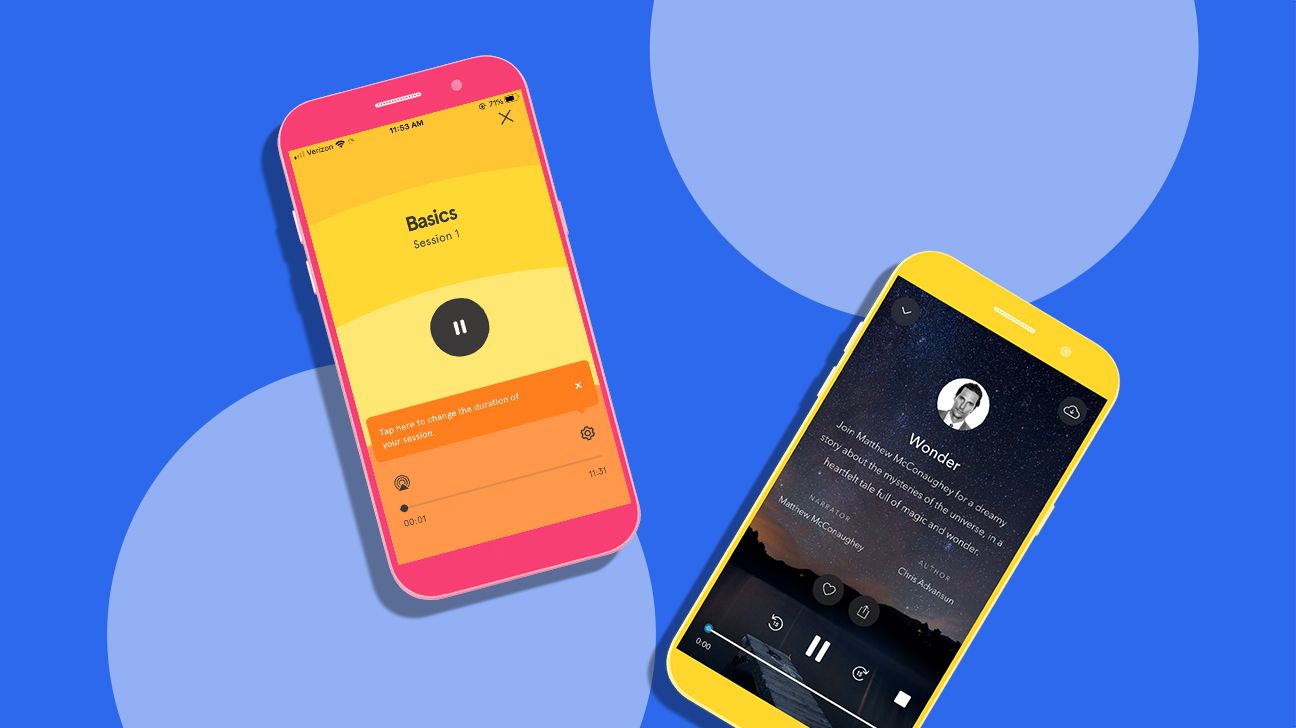We include products we think are useful for our readers. If you buy through links on this page, we may earn a small commission. Here’s our process.
Greatist only shows you brands and products that we stand behind.
Our team thoroughly researches and evaluates the recommendations we make on our site. To establish that the product manufacturers addressed safety and efficacy standards, we:- Evaluate ingredients and composition: Do they have the potential to cause harm?
- Fact-check all health claims: Do they align with the current body of scientific evidence?
- Assess the brand: Does it operate with integrity and adhere to industry best practices?
2020 has been a wild ride. Meditation apps can help if you’re feeling:
a) scared
b) stressed
c) out-of-sync
d) all of the above
Headspace and Calm are two of the best meditation apps on the digital market. So get in the right headspace to keep calm and read on to learn which one’s right for you.
What is meditation? Meditation is a method of calming the mind. The practice promotes self-awareness and redirects negative thoughts. Most forms of meditation involve breath work and visualization.
How does it work? Some meditation techniques are guided, meaning a narrator or instructor will lead you through the session. Other forms are done solo.
Types of meditation include:
- focused meditation
- spiritual meditation
- mantra meditation
- movement meditation
- mindfulness meditation
- transcendental meditation (TM)
- autonomous sensory meridian response (ASMR)
Does meditation work?
Meditation has loads of potential perks. Studies have shown that it’s a great way to boost overall mental and physical health.
There’s evidence that it can help with:
- anxiety
- insomnia
- depression
- weight loss
- chronic pain
- panic attacks
- substance use issues
Some research suggests that meditation can even prevent dementia.
But keep in mind that it’s not a cure-all. If meditation alone isn’t helping your symptoms, reach out to your doctor to get the extra help you need.
Meditation styles aren’t one-size-fits-all. It’s all about what vibe you’re looking for. Here’s what we focused on when comparing Headspace and Calm:
- price
- techniques
- special features
- customer reviews
- subscription options
- length of meditations
This chart will help you pick the meditation app of your dreams.
| App | Price | Meditation length | User experience | Type | Key features |
| Head-space | $12.99/ month $95/ year $399/ lifetime | 3–20 minutes | based on phases of life and meditation experience | guided | explanation with each meditation; founded and narrated by trained Buddhist monk |
| Calm | $12.99/ month $59.99/ year $299/ lifetime | 3–30 minutes | based on goals (better sleep, improved focus, etc.) | guided or not | bedtime stories, music, wallpapers, sounds, and breath work sections |
Headspace offers a super simple approach to meditation. The app was designed to promote feelings of peace and clarity. It might be the better option if you’re new to meditation or mindfulness or you don’t have a lot of time to poke around an app.
1. Totally guided
All Headspace meditations are guided. A narrator will take you through visualization and relaxation techniques.
2. Great for beginners
The app’s straightforward approach is perfect for folks practicing meditation for the first time. It also has check-ins to help you stay on track and reach long-term goals.
3. Monk-approved
The app’s origin story is pretty interesting. Founder Andy Puddicombe, who provides the narrations for the app, was trained as an actual Buddhist monk. Reviewers say his voice is reassuring (and the British accent doesn’t hurt either 😉).
Calm offers a huge variety of meditations, including its famous nature-themed soundtracks. You can switch up your experience whenever you want, so this is the better app if you dig variety.
1. Hit the hay with McConaughey
Want your fave celebrity to tuck you in at night? Calm boasts a bedtime story narrated by Matthew McConaughey. Alright, alright, alright! You can also pick meditations featuring other famous folks, including:
- Lucy Liu
- Laura Dern
- Harry Styles
- LeBron James
- Kelly Rowland
2. Daily nudge
Calm doesn’t pressure you to hit long-term meditation goals. Instead, it focuses more on daily results and offers daily techniques to try. After a while you’ll figure out which meditations are best for you.
3. Kid-friendly
Calm has a whole section geared toward kids. Studies have shown meditation has positive effects on children’s overall psychological health. Research also suggests meditation may improve symptoms of attention deficit hyperactivity disorder (ADHD).
Calm and Headspace are both great in their own ways. Calm is cool if you want to try something new on the reg, and you might prefer Headspace if you like a no-frills approach. The best way to find your favorite is to test them both out with a free trial. It really comes down to what calms you.


